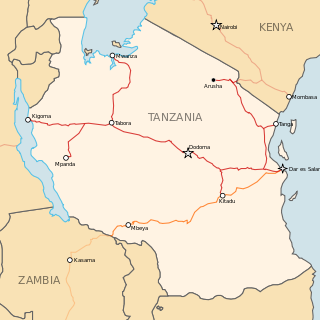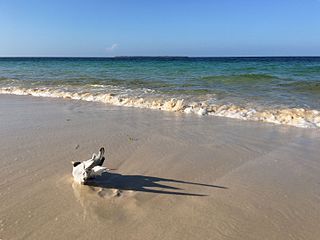
Dar es Salaam is the largest city and financial hub of Tanzania. It is also the capital of the Dar es Salaam Region. With a population of over five million people, Dar es Salaam is the largest city in East Africa and the sixth-largest in Africa. Located on the Swahili coast, Dar es Salaam is an important economic center and one of the fastest-growing cities in the world.

The University of Dar es Salaam (UDSM) is a public university located in Ubungo District, Dar es Salaam Region, Tanzania. It was established in 1961 as an affiliate college of the University of London. The university became an affiliate of the University of East Africa (UEA) in 1963, shortly after Tanzania gained its independence from the United Kingdom. In 1970, UEA split into three independent universities: Makerere University in Uganda, the University of Nairobi in Kenya, and the University of Dar es Salaam in Tanzania.

The Central Line, formerly known as the Tanganyika Railway is the most important railway line in Tanzania, apart from TAZARA. It runs west from Dar es Salaam to Kigoma on Lake Tanganyika via Dodoma. Extensions of the central route branch to the cities of Mwanza on Lake Victoria, Tanga, Singida and Mpanda.

Julius Nyerere International Airport is the international airport of Dar es Salaam, the largest city in Tanzania. It is located in Kipawa ward of Ilala District in Dar es Salaam Region of Tanzania. The airport has flights to destinations in Africa, Asia, Europe, and the Middle East. It is named after Julius Nyerere, the nation's first president.

Bongoyo Island is a protected, uninhabited island under the Dar es Salaam Marine Reserve with the IUCN category II located within Kinondoni District of Dar es Salaam Region in Tanzania. The island situated 2.5 km north of the country's largest city, Dar es Salaam in the indian Ocean. It is the most frequently visited of the four islands of the Dar es Salaam Marine Reserve System (DMRS) and a popular daytrip for both tourists and Tanzanian residents alike for snorkelling and sunbathing. North of the island is Mbudya Island and to the west is Pangavini Island. The island is home to some of Tanzania's largest specimens of endangered coconut crabs.

Ardhi University also known as ARU is a public university located in Makongo in Kinondoni District of Dar es Salaam Region, Tanzania. It was established 28 March 2007, though it has been offering training for more than 60 years in different status. It is situated on Observation Hill close to University of Dar es Salaam, in which it was a constituent college from 1996 to 2007, when it was known as University College of Lands and Architectural Studies—UCLAS. Prior being part of University of Dar es Salaam, Ardhi University was known as Ardhi Institute with history extending to mid-1950s.
CRDB Bank Plc is a commercial bank in Tanzania. It is licensed by the Bank of Tanzania, the central bank and national banking regulator. As of September 2022, CRDB Bank was the largest commercial bank in Tanzania.

The Tanzania Public Service College (TPSC), an institution of higher learning in Tanzania, mandated to offer courses that prepare school leavers for effective delivery of public service to the citizens of the country. The institution also offers refresher courses to active public servants, to improve and update their knowledge-base and skills.

Akiba Commercial Bank (ACB) is a commercial bank in Tanzania. It is licensed by the Bank of Tanzania, the central bank and national banking regulator.
Commercial Bank of Africa (Tanzania)(CBAT) is a commercial bank in Tanzania. It is licensed by the Bank of Tanzania, the country's central bank and national banking regulator. The bank is a subsidiary of the Commercial Bank of Africa Group and has its headquarters in Nairobi, Kenya.
Mwenge is a neighborhood of Kijitonyama ward in Kinondoni District of Dar es Salaam Region in Tanzania, located 8 km northwest of the Dar es Salaam central business district around the intersection of Bagamoyo Road and Sam Nujoma Road.

NCBA Bank Tanzania Limited, is a merged bank between Commercial Bank of Africa (Tanzania) and NIC Bank Tanzania. It is a commercial bank in Tanzania licensed by the Bank of Tanzania, the central bank and national banking regulator.

William Augustao Mgimwa was a Tanzanian CCM politician and Member of Parliament for Kalenga constituency from 2010 to 2014. He also served as Tanzania's Minister of Finance from 2012 to 2014.
Flightlink Limited, formerly Flightlink Air Charters (Tanzania) Limited, is an airline based in the city of Dar es Salaam, in Tanzania. The airline offers scheduled flight services to the primary tourism and business centres across the country. In addition, it offers Air Charter and Medevac services on demand.
The following is a timeline of the history of the city of Dar es Salaam, Tanzania.

The Dar es Salaam commuter rail, informally known as Treni ya Mwakyembe, is an urban and suburban commuter rail network serving the Tanzanian commercial city of Dar es Salaam. It is one of the two initiatives taken by the government to ease travel within the congested city; the other being the Dar es Salaam bus rapid transit system. Services are provided by the Tanzania-Zambia Railway Authority (TAZARA) and the Tanzania Railways Corporation (TRC).
Selcom Microfinance Bank Tanzania (SMBT), previously known as Access Microfinance Bank Tanzania (AMBT), is a microfinance bank located in Tanzania. It is licensed by the Bank of Tanzania, the central bank and national banking regulator.
Bank of Africa Tanzania Limited, also known as BOA Tanzania (BOAT), is one of the commercial banks in Tanzania that have been licensed by the Bank of Tanzania, the country's central bank and national banking regulator.
International Commercial Bank Tanzania Limited(ICBT), is a commercial bank in Tanzania, the third-largest economy in the East African Community. It is licensed by the Bank of Tanzania, the country's central bank and national banking regulator.










